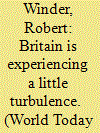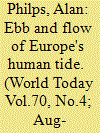| Srl | Item |
| 1 |
ID:
133005


|
|
|
|
|
| Publication |
2014.
|
| Summary/Abstract |
When Nigel Farage and his crop of UKIP MEPs turned their backs on a chamber-orchestra performance of Beethoven's Ninth Symphony at the summer opening of the European Parliament, even sympathisers winced.
As political point scoring went, presenting so loutish a cold shoulder to a masterpiece of western music showed a jarring lack of courtesy, especially since those involved were not, it seemed, planning to reject the attached salary.
It was a sorry protest in that it showed a brazen disregard not merely for 'EU regulations' but for one of the grand peaks of European culture. So far as Britain is concerned, people - and ideas - have been drifting from Europe since the passing of the Ice Age. Not all were nice; not all were brilliant; not all were welcome. But Britain's population is a rich old stew of Iberian, Celtic, Roman, Anglo-Saxon, Danish and Norman folk - even before we include the more varied migrations of the past hundred years. -
|
|
|
|
|
|
|
|
|
|
|
|
|
|
|
|
| 2 |
ID:
133002


|
|
|
|
|
| Publication |
2014.
|
| Summary/Abstract |
For each country the orange area and the figure in light type represent the percentage of migrants in the population in 1990. The red area, with the bold figure, shows the proportion in 2013. In these UN figures, migrants are defined as those born outside their country of residence, including refugees
|
|
|
|
|
|
|
|
|
|
|
|
|
|
|
|
| 3 |
ID:
133004


|
|
|
|
|
| Publication |
2014.
|
| Summary/Abstract |
In little more than two decades, Germany has undergone an extraordinary transformation in attitudes towards immigration.
In the early 1990s, as the recently reunified nation was facing a surge in migrants from the wreckage of the former Soviet Union, and a wave of refugees from civil war in the Balkans, the consensus was that 'Germany is not a country of immigration'.
Migrant workers who had flocked to join the German economic miracle in previous decades from Turkey, Greece, Italy and North Africa, were regarded as gastarbeiter - guest workers - who were expected to return home when their jobs were done.
|
|
|
|
|
|
|
|
|
|
|
|
|
|
|
|